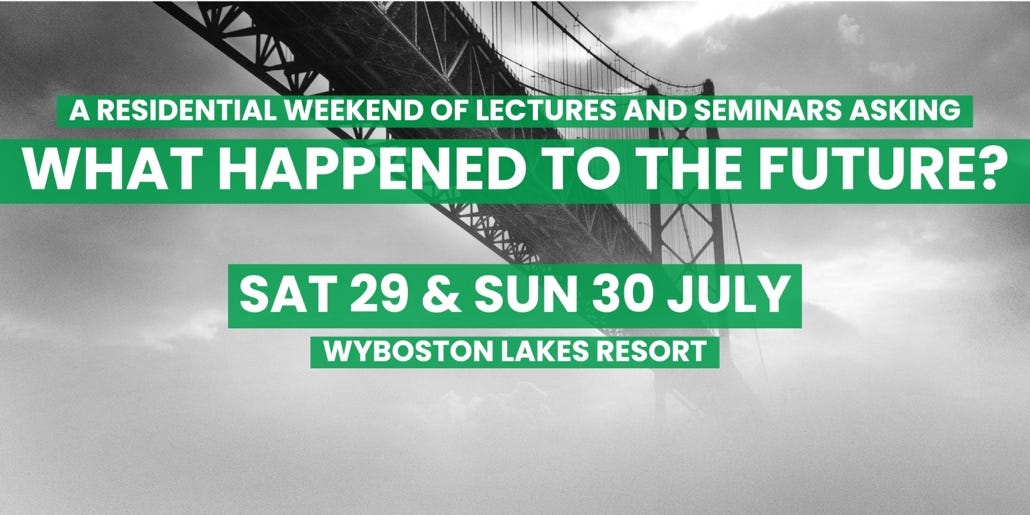What is radical today? Does anyone have an idea that might inspire?
An invitation to Ideas Matter's annual residential weekend, The Academy
Each year, we encourage everyone to join us at Ideas Matter’s residential weekend The Academy. It is a chance to step back and consider our current moment in the view of longer trends. This year, we are going to be asking where the future went.
It might seem a tangent, but the importance of this question was made plain to me as I’ve been trying to understand the French protests against Macron’s pension reforms. Aside from a very welcome horror at Macron’s disdain towards democratic processes – the Jupiter-President who governs by decree – I can’t say I have a clear idea of what drives the protests and what they mean.
But one thing did strike me in the coverage about the protestors: they were repeatedly described as ‘radicals’. Aside from the tendency to man the barricades being hardly an unusual quality in French democracy (Aux armes, citoyens! Formez vos bataillons! as La Marseille goes) I was wondering whether the protestors really were radical.
Radical movements throughout history have usually been those agitating for, often almost religiously inspired by, a big vision of what the future might look like. In France, by contrast, the protestors want everything to stay the same. They might be justified, but they are hardly radical.
It is sometimes tempting to see this as a widespread malaise that runs through contemporary politics: big, inspiring ideas are conspicuous by their absence, and in their place we have either frightening visions of the future (like climate change) or the dead hand of managerial technocracy (like the EU). The most radical we seem to be able to get are demands to wind the clock back a few years – to re-nationalise this or re-introduce that.
One of the interesting things is this mood isn’t restricted to politics: culture, too, seems stuck in something of a rut. Theatres and opera houses repeating the same small number of big hits, cinemas full of remakes and reboots, endless variations of the same detective books, fantasy novels, or heartbreaking accounts of a young woman from a marginalised community coming to terms with her identity.
Politically, though, there is no shortage of demand for something new – think of the waves of populist revolts across the West, fuelled by those fed-up with the depressing status-quo. But no-one, and certainly no politicians, seem to have anything to offer us.
It wasn’t always thus. It is hardly original but still very necessary to point out that the grand ideologies of the 19th and 20th Centuries offered big visions of the future – and called on society to fundamentally transform in order to get there. Similarly, in art and culture for some centuries the dominant mood was one of fundamentally transforming the old ways of doing things, to embrace new perspectives or technologies. The often wacky but certainly bold ideas of radical Futurism was merely the most obvious example of this general trend.
Or consider the history of utopian thinking that goes back at least as far as Plato: a sense that with serious thought and political effort society could look completely unlike how it is today. One could also mention the rich material in science fiction: we were promised not just flying cars or spaceships but fundamentally new ways of organising society. Yet today, to the extent to which anyone does dare dream of the future it is not merely dystopian but boringly so. Previous dystopias like A Brave New World were exciting even if horrifying – today’s parade of Handmaid’s Tale style fantasies are just, well, dull.
Recent technological history seems instructive of this loss of vision. The early pioneers of the internet dreamed of a new society – a new republic of letters liberated from the constraints of time and space. No matter where you lived or who you were, you’d be equally able to interact with the rest of the world. Today, our tech pioneers compete to offer us marginally improved ways to post photos of our dinner. Even someone like Elon Musk – often given as an example of a real pioneer – only wants to go to Mars because he thinks humanity is doomed on Earth.
Even if we take the most wildly optimistic predictions for artificial intelligence tech like ChatGPT (which are almost certain not to come true) there is something disquieting. Not only is ChatGPT hamstrung by the inability to give anything but a politically correct answer, but there is a thinly veiled horror at what might happen if it really did liberate us from boring, repetitive computer tasks like churning out code or doing your tax returns. What would we do in such a world, people ask. More time for TikTok?
But we really do and truly need something bigger and inspiring. Whether you think the world is challenged by climate change or by the dangerous disappearance of economic dynamism, if you’re agitated by social injustice or pissed off by the technocratic class lording it over us, or even if you just want to read an original novel again – we need to inject some dynamism into political and social life.
From the Dutch farmers to those French protestors, there is certainly lots of energy in political life. Our job should be to try and articulate where it should all go.
To do this, we need to think deeply and understand a lot more about the world we live in, where it came from, and where it might be going. This is why I organise an annual event called The Academy – an intellectual retreat for curious minds. A weekend of lectures and discussions, great company and good food, lots of books and plenty of arguments. This year, our theme is ‘What happened to the Future?’. We’ve got discussions on why utopia matters, what happened to culture, the first transhumanist, and whether the woke war on the past holds some clues for why the future seems to have gone on leave.
I would love to see you there, where maybe we can make a start at rekindling some faith in the possibility that the future could be different – radically different – to today.
THE ACADEMY 2023: WHAT HAPPENED TO THE FUTURE?
SAT 29 & SUN 30 JULY 2023
WYBOSTON LAKES RESORT, BEDFORDSHIRE
Has progress become a dirty word?
Why does a better future seem so hard to imagine?
Do we still need to dream of utopia?
Join us at The Academy 2023, for a weekend of lectures and discussions on history, philosophy and literature. This residential weekend at Wyboston Lakes Conference Centre, Bedfordshire is a chance to step back from contemporary politics, delve into ideas, and rediscover the confidence to build a brighter future.
SESSIONS WILL INCLUDE:
• Why utopia matters: understanding history and progress
• Cultural exhaustion – remakes and originality
• The apocalyptic imagination: from religion to XR
• The war on the past and the end of the future
• The first transhumanist? Haldane's ‘Daedalus’ 100 years on
• Is progress a thing of the past?
SPEAKERS INCLUDE:
Sherelle Jacobs • Frank Furedi • Tim Black • Tiffany Jenkins • Sandy Starr • Maren Thom • And many more to be announced.
EARLYBIRD TICKET OFFER UNTIL 15 MAY:
We are delighted to announce that earlybird discounted tickets are now on sale for a limited time only. Tickets start at £215 for a weekend including accommodation, meals, and lectures – not to mention the chance to carry on discussions with fellow attendees at drinks and dinner.
• One night, single occupancy £215 Buy tickets
• One night, double occupancy £370 Buy tickets
• Two nights, single occupancy £300 Buy tickets
• Two nights, double occupancy £500 Buy tickets
• Day tickets available from £60 Buy tickets
• Concession rates are available for full time students, senior citizens and unwaged
READING LISTS AND MORE INFORMATION:
Please visit the Academy page for more information and an initial reading list: https://ideasmatter.org.uk/the-academy-2023-what-happened-to-the-future
For further information contact Jacob Reynolds jacob@ideasmatter.org.uk or Geoff Kidder geoff@ideasmatter.org.uk







Excellent